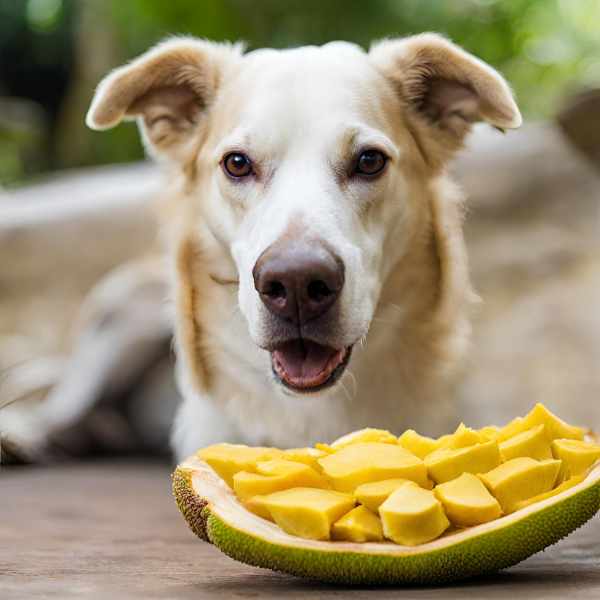The short answer is yes! dogs can eat jackfruit in small amounts. Jackfruit is a great source of nutrition for canines and can even be beneficial in some cases.
It contains many vitamins and minerals such as vitamin C, magnesium, potassium, and iron which can help boost your dog’s immune system. Jackfruit is also a great source of dietary fiber which can help keep your pup regular and promote good digestion.
Benefits of Jackfruit for Dogs
Here are some of the benefits of jackfruit for dogs:

Rich in Fiber: Jackfruit is an excellent source of dietary fiber, which can help promote healthy digestion and prevent constipation in dogs. Fiber also helps regulate blood sugar levels and can promote a feeling of fullness.
Immune Boosting: Jackfruit is rich in vitamin C, which is a powerful antioxidant that can help boost your dog’s immune system. A strong immune system can help protect your dog against infections and diseases, keeping them healthy and happy.
Good for Heart Health: Jackfruit is a good source of potassium, which is essential for maintaining healthy heart function. Potassium helps regulate blood pressure and can help prevent heart disease in dogs.
Helps with Skin and Coat Health: Jackfruit is rich in vitamins A and E, which are essential for maintaining healthy skin and a shiny coat. These vitamins can also help prevent skin irritations and keep your dog’s coat soft and smooth.
Low in Fat and Calories: Jackfruit is a low-fat and low-calorie food, making it a great snack option for dogs who are overweight or obese. It can also be used as a healthy alternative to high-calorie treats.
Natural Anti-inflammatory: Jackfruit contains natural anti-inflammatory properties that can help reduce inflammation in the body, which can help alleviate pain and discomfort in dogs with arthritis or other inflammatory conditions.
Good for Dental Health: The chewing action required to eat jackfruit can help clean your dog’s teeth and promote healthy gums. Chewing can also help reduce tartar buildup and prevent dental problems like bad breath and tooth decay.
Risks of Jackfruit for Dogs
Here are some things to keep in mind when feeding your dog jackfruit:

High Carbohydrates: Jackfruit can be high in carbohydrates, which can cause an upset stomach if fed in large amounts. Start with a small portion of jackfruit and slowly increase the amount as your dog gets used to it.
High Sugar Content: Jackfruit can also be quite high in sugar content, so it is not recommended for dogs who are prone to diabetes or obesity.
Allergic Reaction: Some dogs can have an allergic reaction to jackfruit, so it is important to watch for any signs of an adverse reaction such as vomiting, diarrhea, or hives.
Precautions When Feeding Jackfruit to Dogs
Before feeding jackfruit to your dog, there are a few precautions you should take to ensure their safety and well-being:

- Remove the seeds: The seeds of jackfruit are not toxic to dogs, but they can pose a choking hazard or cause digestive problems if ingested. It is best to remove the seeds before feeding jackfruit to your dog.
- Limit the amount: Although jackfruit is safe for dogs to consume, it should be given in moderation. Too much jackfruit can cause stomach upset, diarrhea, or other digestive issues.
- Allergic reactions: Some dogs may be allergic to jackfruit, so it is essential to monitor your dog’s reaction after feeding them jackfruit for the first time.
- Signs of an allergic reaction include itching, swelling, hives, or difficulty breathing.
- If your dog exhibits any of these symptoms, stop feeding them jackfruit immediately and consult your veterinarian.
